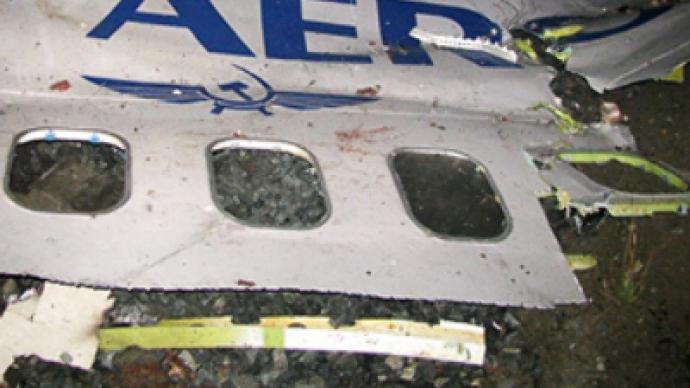Russian press on Monday

Every front page has at least a few lines about yesterday’s crash of an “Aeroflot-Nord” Boeing 737 in Perm. Russia mourns the 88 crash victims. The “Valdai Club” meeting is still in the news, now with more commentaries.
ROSSIYSKAYA GAZETA publishes the most detailed report on the airplane crash in Perm. The paper says, the jet, a Boeing 737-500 belonging to an affiliate of Aeroflot, a company called “Aeroflot-Nord”, crashed within the city limits, approximately 200 meters away from the nearest house. Locals say, the paper continues, it was evident the pilots were trying to steer the falling aircraft away from dwellings on the ground, so they chose to try a crash-landing on the railroad tracks, with their safety zone 200 meters wide on both sides. Thanks to that maneuver, no life was lost on the ground. The paper says, the aircraft itself, by eyewitness accounts, had no chance, falling at a 40 degree angle and at a speed much higher than landing speed. Early estimates attribute the crash to an engine failure, writes the newspaper.
The same paper also publishes the full text of the discussion between President Dmitry Medvedev and members of the “Valdai Club”.
IZVESTIA writes latest events in international politics indicate a serious change in Russia’s foreign policy is imminent. It’s a pity, writes the paper, that our urges, calls, requests which were included in a most pleasant and considerate way into our Foreign Policy Concept, went totally unheard and unheeded by many of our “partners”, so our declarations of partnership or even alliance produced no effect. It means, continues the paper, that it’s time to seriously reconsider our foreign policy priorities, and that is exactly what President Medvedev means when he says that. The headline over the report from the “Valdai Club” meeting reads: “We will help the West become adequate.”
TRUD says that, besides the meetings with President Dmitry Medvedev and Prime Minister Vladimir Putin, the members of the “Valdai Club” met with Gary Kasparov who shared with them his opinion about the lack of press freedom in Russia – the paper says, largely to no avail.
The same paper has short estimates of the meeting and the overall situation under the headline: the Valdai Opinions. Nikolai Zlobin, World Security Institute, Washington: “Russia doesn’t want to look up to the West as if standing before a high-school Principal. It doesn’t want to be taught by the West and doesn’t need the West to give it marks. There will be no new cold war if the West doesn’t mistake (Russia’s) rhetoric for real intentions.” Ariel Cohen, The Heritage Foundation: “I came here worried and I’m leaving frustrated and saddened. Nothing has dissuaded me from the idea that we are standing on the brink of a global crisis comparable, not with the cold war, but rather, with the situation before WW I.” Peter Dutkevich of Carlton University: “The situation in Russian politics is paradoxical and dangerous: the opposition has no wish to cooperate with the government and use it for its purposes. The government, in turn, prefers to ignore the opposition and thus narrows its own support base.” Anatol Lieven, the New America Foundation: “International law is being torn apart by different forces. We live in a world without superpowers. Great powers have become, to a large extent, hostages of smaller and weaker nations.”
KOMMERSANT writes, in spite of its profound attempts to look as neutral as possible in relation to the war in South Ossetia and its aftermath, that China is very much interested in the events in the Caucasus. The paper continues: a recent visit by a delegation of officials of the Central Committee of the Chinese Communist party showed that China is watching the energy scene with utmost attention. The paper says, in the case of a long-term conflict between Russia and the West China could not only count on acquiring a system of pipelines for direct gas and oil supply from Russia but it could also be sure of securing for itself a much bigger share in Central Asian oil and gas than it can afford at the moment.
VREMYA NOVOSTEI reports from Tbilisi that Russian peacekeepers have already abandoned their positions in Georgia proper, along the Poti – Senaki line, and left. They did it two days ahead of the schedule agreed upon in Moscow by Presidents Nicholas Sarkozy and Dmitry Medvedev. The paper continues to say that local authorities in Poti confirm that information.
NEZAVISIMAYA GAZETA reports, under the headline “Special Forces Beat Diplomacy” that Georgia plans to deploy its special forces in the areas previously held by Russian peacekeepers inside the “security zones”, i.e. much closer to the borders of South Ossetia and Abkhazia than Russia is prepared to tolerate. This step, showing that the Georgian president is not ready “to let it go” at all, may well become the trigger of another armed conflict. The paper says, so far, the most dangerous situation has formed along the border between Georgia and Abkhazia.












